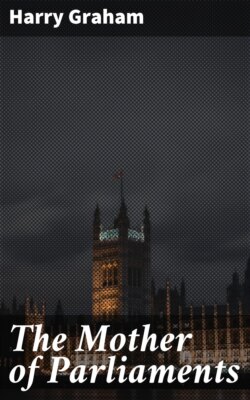The Mother of Parliaments

Реклама. ООО «ЛитРес», ИНН: 7719571260.
Оглавление
Graham Harry. The Mother of Parliaments
The Mother of Parliaments
Table of Contents
PREFACE
THE MOTHER OF PARLIAMENTS
CHAPTER I
PARLIAMENT AND PARTY
CHAPTER II
THE HOUSE OF LORDS
CHAPTER III
THE HOUSE OF COMMONS
CHAPTER IV
THE PALACE OF WESTMINSTER
CHAPTER V
HIS MAJESTY'S SERVANTS
CHAPTER VI
THE LORD CHANCELLOR
CHAPTER VII
THE SPEAKER
CHAPTER VIII
THE OPENING OF PARLIAMENT
CHAPTER IX
RULES OF DEBATE
CHAPTER X
PARLIAMENTARY PRIVILEGE AND PUNISHMENT
CHAPTER XI
PARLIAMENTARY DRESS AND DEPORTMENT
CHAPTER XII
PARLIAMENTARY ELOQUENCE
CHAPTER XIII
PARLIAMENT AT WORK—(1)
CHAPTER XIV
PARLIAMENT AT WORK (II)
CHAPTER XV
STRANGERS IN PARLIAMENT
CHAPTER XVI
PARLIAMENTARY REPORTING
SOURCES AND REFERENCES
INDEX
Footnote
Отрывок из книги
Harry Graham
Published by Good Press, 2021
.....
The Lords have never objected as strongly as the Commons to the royal presence. Charles II. often found the time hang heavy on his hands, and would stroll down to the Upper House, "as a pleasant diversion." He began by sitting quietly on the Throne, listening to the debates. Later on he took to standing by the fireplace of the Lords, where he was soon surrounded by many persons anxious to gain the royal ear, and thus "broke all the decency of that House."[13] Since the accession of Queen Anne, however, no Sovereign has been present in Parliament, save at the opening or closing ceremonies. But long after kings had ceased to attend Parliament in person they continued to attempt the control of its proceedings. George III. finally brought matters to a head by his perpetual interference with the affairs of the Commons, and caused the passing of that momentous resolution, moved by Dunning on April 6, 1780, "that the influence of the Crown has increased, is increasing, and ought to be diminished," which disturbed if it could not vex Dr. Johnson.[14]
Between 1688 and 1832 political life in England was excessively corrupt. Parliament had grown to a certain extent independent of the Crown, but had not yet learnt to depend upon public opinion. It was consequently a difficult body to deal with, and had to be managed by a system of open bribery which first showed itself most conspicuously in the shape of retaining fees paid to Scottish members.[15] In 1690 the practice of regularly bribing members of the House of Commons was undertaken by the Speaker, Sir John Trevor, on behalf of the Tory party. In Queen Anne's reign a statesman paid thousands of pounds for the privilege of being made Secretary of State, and a few years later we find Sir Robert Walpole assuring a brother of Lord Gower that he knew the price of every man but three in the House of Lords.[16]
.....